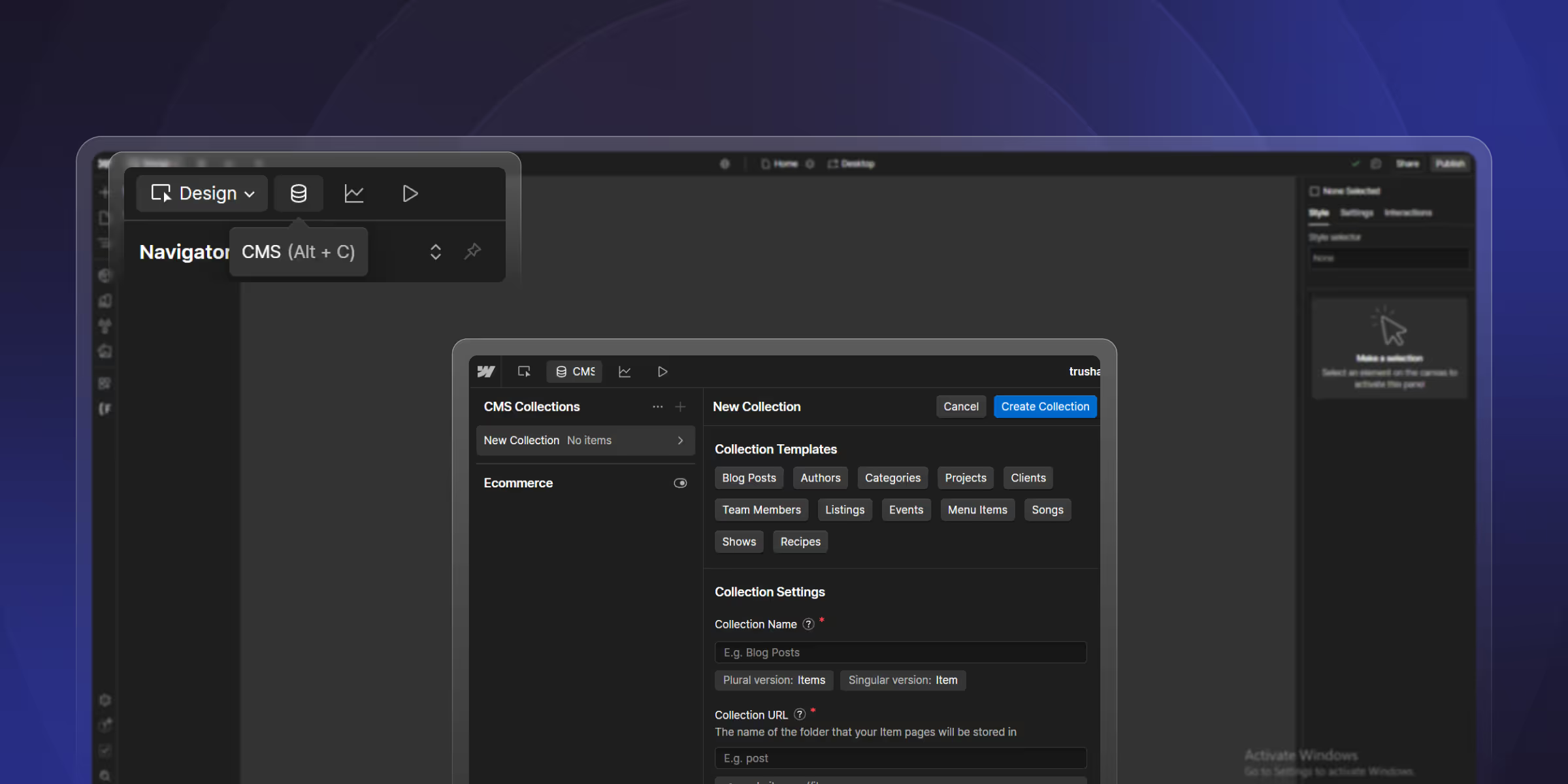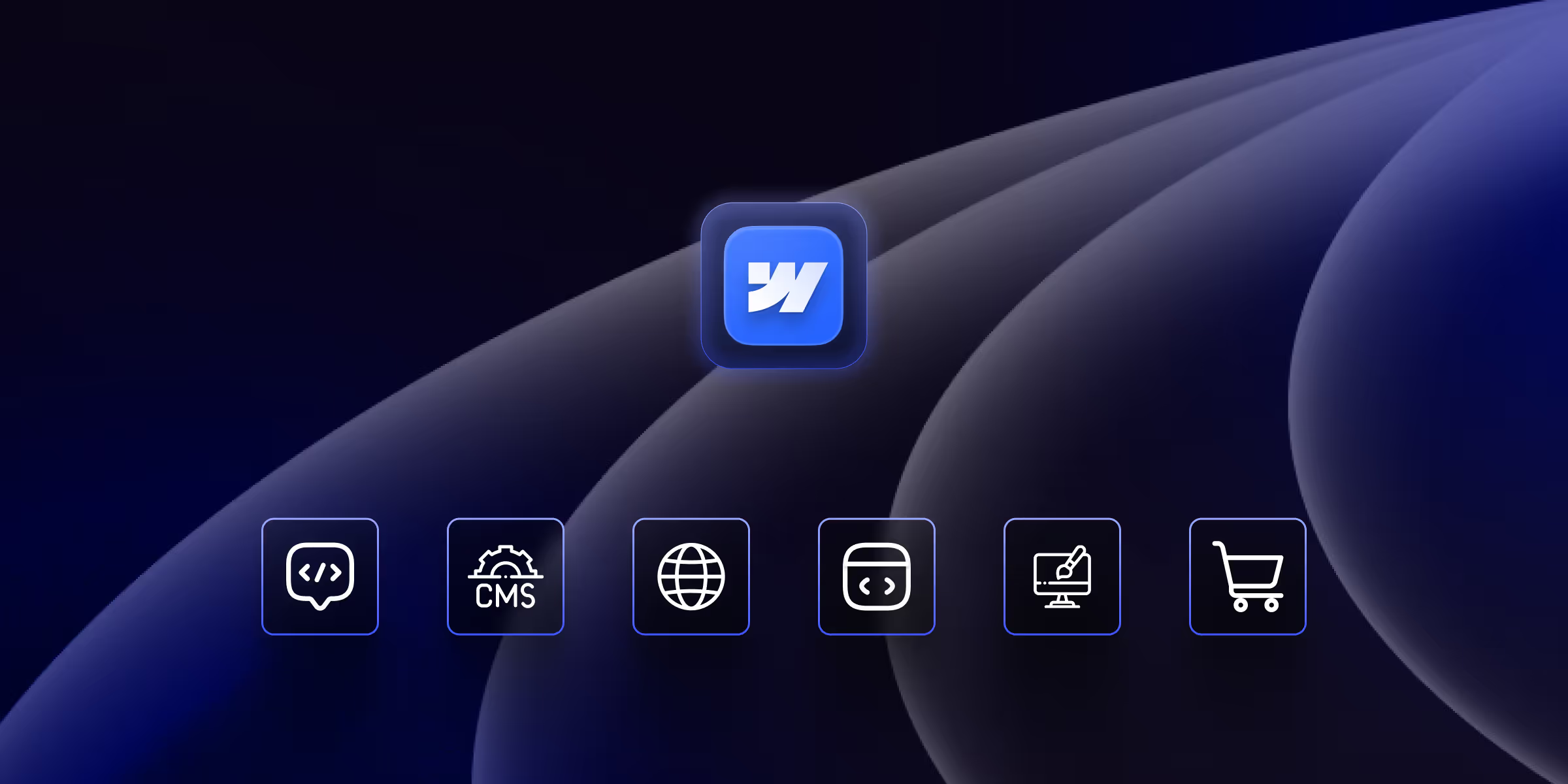Top 10 Webflow Development Agencies in 2026
Find the top 10 Webflow Agencies in 2026. Find the perfect partner to build high-converting, SEO-optimized websites for your business.
.avif)
Actionable insights to improve SEO, speed, and conversions

Webflow and Wix are both popular website creation tools that make website design easier and faster. They both offer drag-and-drop interfaces, allowing users to quickly design custom websites without the need to code. With Webflow and Wix, beginner and experienced web developers alike have the ability to create stunning and complex websites with minimal coding knowledge.
The main differences are seen in the capabilities for design and development. Webflow offers a more comprehensive choice of options and features than Wix, providing users more in terms of design tools and components.
This 2025 analysis reveals why Webflow consistently outperforms Wix across the metrics that matter most: design flexibility, performance, SEO capabilities, and long-term scalability. While Wix may appeal to beginners seeking simplicity, Webflow delivers professional-grade results that drive real business outcomes.
Webflow was designed from the ground up as a professional web development platform that happens to be visual, not a simple website builder with professional aspirations. It generates production-ready code while providing unprecedented creative control through an intuitive visual interface.
Core Philosophy: Webflow empowers designers, agencies, and businesses to create custom websites with the precision of hand-coded solutions while maintaining the efficiency of visual design tools.
Wix positions itself as a consumer-friendly platform prioritizing ease of use over professional capabilities. While this approach works for basic websites, it creates fundamental limitations that become apparent as businesses grow.
Core Philosophy: Wix focuses on getting users online quickly with minimal effort, using templates and drag-and-drop simplicity to appeal to users who view websites as a necessary utility rather than a strategic business asset.
Complete Creative Freedom: Webflow provides unlimited design control with advanced CSS Grid and Flexbox systems, custom breakpoints, and pixel-perfect positioning.
Advanced Typography and Visual Hierarchy: Webflow's typography system rivals professional design software, offering comprehensive font management, custom web fonts, advanced text styling, and global typography systems.
Industry-Leading Animations: Webflow's interaction system enables complex animations, scroll-triggered effects, and micro-interactions that create engaging user experiences.
Responsive Design Mastery: With up to 7 custom breakpoints, Webflow provides granular control over how designs adapt across devices. Each element can be customized for optimal display on desktop, tablet, and mobile, ensuring perfect user experiences across all screen sizes.
Template Dependency: Wix's strength in templates becomes a weakness for businesses requiring unique brand expression. While templates provide quick starts, they create a homogenized web where many sites look similar, diluting brand differentiation.
Limited Customization Control: Wix's drag-and-drop interface, while user-friendly, restricts design possibilities. Users cannot access underlying CSS or create truly custom layouts, limiting creative expression and professional results.
Basic Animation Capabilities: Wix offers simple entrance effects and basic animations, but lacks the sophisticated interaction capabilities that modern users expect. This limitation becomes apparent when competing against professionally designed websites.
Responsive Design Constraints: Wix's automatic responsive design removes user control, often resulting in suboptimal mobile experiences. Users cannot fine-tune mobile layouts, leading to compromised user experiences on smaller screens.
Enterprise-Grade Infrastructure: Webflow leverages AWS (Amazon Web Services) and Fastly CDN for hosting, providing enterprise-level performance and reliability.
Clean Code Generation: Webflow automatically generates semantic, lightweight HTML and CSS that follows web standards. This results in faster browser parsing, better SEO performance, and superior user experiences without requiring technical optimization.
Automatic Optimization: Built-in image compression, CSS/JavaScript minification, browser caching, and WebP conversion optimize performance automatically. These features typically require plugins or manual implementation on other platforms.
Core Web Vitals Excellence: Webflow sites consistently achieve 90+ scores on Google PageSpeed Insights, meeting Google's Webflow Core Web Vitals requirements that directly impact search rankings and user experience.
Bloated Code Structure: Wix generates significant JavaScript overhead and proprietary code that slows page loading. Industry tests show Wix sites averaging 3-5 seconds load times, significantly slower than Webflow's performance.
Limited Optimization Control: Users cannot optimize Wix sites for performance beyond basic settings. This limitation becomes critical for businesses competing in performance-sensitive markets or targeting mobile users.
Hosting Constraints: While Wix includes hosting, the shared infrastructure lacks the enterprise-grade performance of Webflow's AWS-powered solution, resulting in slower response times and less reliability.
Mobile Performance Issues: Wix's mobile performance often suffers due to code bloat and limited optimization options, directly impacting user experience and search rankings in Google's mobile-first indexing environment.
Technical SEO Excellence: Webflow provides complete control over technical SEO elements including meta titles, descriptions, URL structures, Open Graph tags, and schema markup. This granular control enables sophisticated SEO strategies impossible with Wix's limited options.
Clean Code Benefits: Search engines prefer clean, semantic code for crawling and indexing. Webflow's automatically generated code provides SEO advantages through faster crawling, better content understanding, and improved rankings.
Performance SEO: Page speed is a confirmed Google ranking factor. Webflow's superior performance directly benefits SEO, with faster sites ranking higher than slower competitors in search results.
Advanced SEO Features: Custom redirects, canonical tags, automatic XML sitemaps, and robots.txt editing provide professional-level SEO control. These features enable complex SEO strategies and migrations without losing search rankings.
CMS SEO Power: Webflow's CMS enables creation of hundreds of optimized pages with dynamic content, supporting content marketing strategies that drive organic traffic growth.
Basic SEO Tools: While Wix has improved its SEO features, it still provides only basic optimization capabilities. Advanced SEO techniques require workarounds or remain impossible to implement.
Code Bloat Impact: Wix's bloated code structure negatively impacts SEO through slower loading times and more complex crawling for search engines. This technical debt accumulates over time, affecting long-term search performance.
Limited Technical Control: Wix users cannot implement advanced SEO strategies like complex redirects, custom schema markup, or sophisticated URL structures. These limitations become critical for competitive markets or complex websites.
Performance Penalties: Slower loading speeds directly impact SEO rankings. Wix sites' performance disadvantages translate to lower search rankings compared to faster competitors.
Custom Shopping Experiences: Webflow enables complete customization of product pages, checkout processes, and shopping flows. This design freedom allows brands to create unique e-commerce experiences that convert better than generic templates.
Professional Checkout Design: Unlike Wix's standard checkout process, Webflow allows complete checkout customization, enabling brands to maintain consistency throughout the entire shopping experience.
Scalable Architecture: Webflow's e-commerce solution grows with businesses, supporting up to 3,000 products on advanced plans with enterprise-grade hosting and security.
Built-in Features: Wix offers comprehensive e-commerce features including unlimited products, abandoned cart recovery, and multiple payment gateways. These features provide good functionality for basic online stores.
Template Limitations: Wix e-commerce sites often look similar due to template constraints, making it difficult to differentiate from competitors and build unique brand experiences.
Performance Impact: Feature-rich but bloated code affects e-commerce performance, potentially reducing conversions due to slower loading times and less responsive user interfaces.
Transparent Value: Webflow's pricing includes enterprise-grade hosting, security, performance optimization, and professional capabilities. The higher cost reflects superior value and capabilities.
No Hidden Costs: Webflow's pricing includes all essential features without surprise charges or feature limitations that require upgrades for basic functionality.
ROI Through Performance: Webflow's performance advantages generate measurable ROI through better conversion rates, improved SEO rankings, and enhanced professional credibility.
Long-term Investment: Webflow pricing represents investment in a platform that grows with businesses rather than expense on a platform they'll outgrow.
Feature Limitations: Wix's lower pricing often requires upgrades for basic professional features, making total costs comparable while providing inferior capabilities.
Performance Cost: The business cost of slower loading sites and limited SEO capabilities often exceeds any savings from Wix's lower pricing.
Migration Inevitability: Most growing businesses eventually migrate from Wix, making the initial lower cost a temporary savings before inevitable platform switching costs.
Opportunity Cost: Wix's limitations prevent businesses from achieving their full online potential, creating opportunity costs that far exceed platform savings.
Custom Code Integration: Webflow supports custom HTML, CSS, and JavaScript integration, enabling advanced functionality while maintaining visual design control.
Advanced Integrations: Professional-grade API access and webhook capabilities enable sophisticated business system integrations and automation.
Team Collaboration: Advanced user roles, project management, and collaboration features support professional workflows and agency operations.
Export Capabilities: Complete code export ensures businesses aren't locked into the platform and can transition to custom development if needed.
Limited Technical Access: Wix restricts access to underlying code and technical capabilities, limiting customization and professional development options.
Basic Integrations: While Wix offers app integrations, they're typically consumer-focused rather than supporting sophisticated business processes.
Platform Lock-in: No export capabilities create vendor dependency that becomes problematic as businesses grow and require more sophisticated solutions.
Consumer-Grade Features: Wix's features prioritize ease of use over professional capabilities, limiting business growth potential.
The comparison between Webflow and Wix isn't about personal preference – it's about measurable outcomes and professional requirements. Across every metric that matters for business success, Webflow consistently outperforms Wix:
Performance Leadership
Design Excellence
SEO Superiority
Long-term Value
Webflow isn't just better than Wix – it's in a different category entirely. While Wix serves the consumer market with basic website building, Webflow provides professional-grade capabilities that support business growth and success.
Ready to experience the Webflow difference? The platform that powers millions of professional websites, supports growing businesses, and delivers measurable results is ready to transform your online presence. Choose the platform that successful businesses trust – choose Webflow.
Ready to harness Webflow's superior capabilities for your business? Contact theCSS Agency, certified Webflow experts who specialize in creating high-performance websites that drive real business results. Our team understands why professionals choose Webflow and can help you leverage its full potential for maximum impact.
Webflow is renowned for its advanced design capabilities, offering visual coding and a more intricate design interface. Wix, on the other hand, is known for its user-friendly drag-and-drop editor, catering to a broad user base.
Wix is often considered more beginner-friendly with its straightforward interface, making it accessible for users with minimal design or coding experience. Webflow, while powerful, may have a steeper learning curve.
Both platforms support e-commerce, but Webflow is favored for its flexibility in customizing online stores. Webflow allows for more intricate design choices, while Wix provides a simpler, template-driven approach.
Webflow is often praised for its advanced SEO capabilities, providing users with more control over on-page SEO elements. Wix also offers SEO tools, but Webflow may be preferred for those seeking a more SEO-focused platform.
Migrating between Webflow and Wix is possible, but the ease of the process depends on the complexity of your website. Both platforms provide guides and resources to assist with migration, but planning is crucial for a smooth transition.

Find the top 10 Webflow Agencies in 2026. Find the perfect partner to build high-converting, SEO-optimized websites for your business.

Learn how to create a blog on Webflow with a step-by-step guide. From CMS setup to SEO practices, build a responsive, custom blog without coding.

Find the top Webflow key features that make it a powerful platform for designers and developers.
Quick Turnaround. No Contracts. Cancel Anytime. Book a 30 minutes consulting call with our expert.